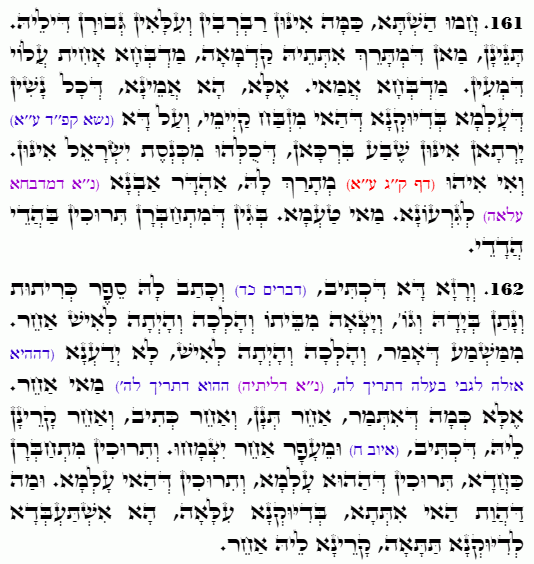Daily Zohar # 4786 – Mishpatim – And he shall write for her a bill of divorce
Daily Zohar 4786

Hebrew translation:
162. וְסוֹד זֶה, שֶׁכָּתוּב (דברים כד) וְכָתַב לָהּ סֵפֶר כְּרִיתֻת וְנָתַן בְּיָדָהּ וְגוֹ’, וְיָצְאָה מִבֵּיתוֹ וְהָלְכָה וְהָיְתָה לְאִישׁ אַחֵר. מִמַּשְׁמָע שֶׁאָמַר וְהָלְכָה וְהָיְתָה לְאִישׁ, לֹא יָדַעְנוּ (שֶׁאוֹתָהּ שֶׁהוֹלֶכֶת אֵצֶל בַּעְלָהּ שֶׁגֵּרַשׁ אוֹתָהּ) (שֶׁזֶּה אֵינוֹ) (אוֹתוֹ שֶׁגֵּרַשׁ אוֹתָהּ)? מַה זֶּה אַחֵר? אֶלָּא כְּמוֹ שֶׁנֶּאֱמַר, שָׁנִינוּ אַחֵר, וְאַחֵר כָּתוּב, וְאַחֵר קוֹרְאִים אוֹתוֹ, שֶׁכָּתוּב (איוב ח) וּמֵעָפָר אַחֵר יִצְמָחוּ. וְהַגֵּרוּשִׁים מִתְחַבְּרִים כְּאֶחָד, גֵּרוּשִׁים שֶׁל אוֹתוֹ הָעוֹלָם וְגֵרוּשִׁים שֶׁל הָעוֹלָם הַזֶּה. וּמַה שֶּׁהָאִשָּׁה הַזּוֹ הָיְתָה בִּדְיוֹקָן עֶלְיוֹן, הֲרֵי הִשְׁתַּעְבְּדָה לִדְיוֹקָן תַּחְתּוֹן, קוֹרְאִים לוֹ אַחֵר.
.
Zohar Mishpatim
Continued from previous DZ
#161
See now how great and important His might (Gevurot, גבורות) is. We have learned that one who divorces his first wife—the altar sheds tears for him. He asks: Why the altar? And he answers: Rather, I say that all the women in the world stand in the form of this altar, which is Malchut, for every woman has her root in Malchut. Therefore, they inherit the seven blessings, all of which stem from the Congregation of Israel, which is Malchut. And if a man divorces his first wife, the stone of the upper altar return—that is, the root of this woman, which is in Malchut—diminishes and is reduced. Why is this so? Because the divorced women become connected together. Just as she was divorced from her husband, so too is she severed from her roots in Malchut.
Notes:
Marriage is spiritually aligned with Malchut, and divorce weakens that connection. The altar weeping symbolizes the sorrow caused by severing a sacred bond, as a divorced woman is not only separated from her husband but also from her spiritual root, Malchut. This passage highlights the deep implications of relationships in the spiritual realm.
#162
This is the secret of what is written: “וְכָתַב לָהּ סֵפֶר כְּרִיתֻת וְנָתַן בְּיָדָהּ” “And he shall write for her a bill of divorce, and place it in her hand…” and “וְיָצְאָה מִבֵּיתוֹ וְהָלְכָה וְהָיְתָה לְאִישׁ אַחֵר” “she shall leave his house and go and become another man’s wife” (Deuteronomy 24:1-2).
He asks: Since it already says, “she shall go and become another man’s wife,” do I not already understand that it is not the same man who divorced her? Why, then, does the verse specify “another” (אַחֵר)?
He answers: As we have learned, “another” (אַחֵר) teaches us something deeper. The term “another” is written in several places, and it is used elsewhere in the phrase, “וּמֵעָפָר אַחֵר יִצְמָחוּ” “and from another soil (עפר, earth) they will spring forth” (Job 8:19). This teaches that a reincarnated soul is called “another” (אַחֵר).
Thus, divorced women become connected in a certain way. A divorced man from the upper world—that is, a reincarnated soul that has no destined soulmate, as he was expelled from the spiritual realm into this world—marries a divorced woman who was separated from her husband in this world.
Since this woman originally had a lofty form rooted in Malchut, she now becomes subjugated to a lower form—that is, to the reincarnated soul (Gilgul) that has no predetermined soulmate, and he takes her as his wife. This reincarnated soul is called “Acher” (אַחֵר, Another), as it is later explained that he was attached to a foreign god (אל אחר, El Acher), which caused him to be reincarnated into this world.
{||}

 Previous: Mishpatim
Previous: Mishpatim

